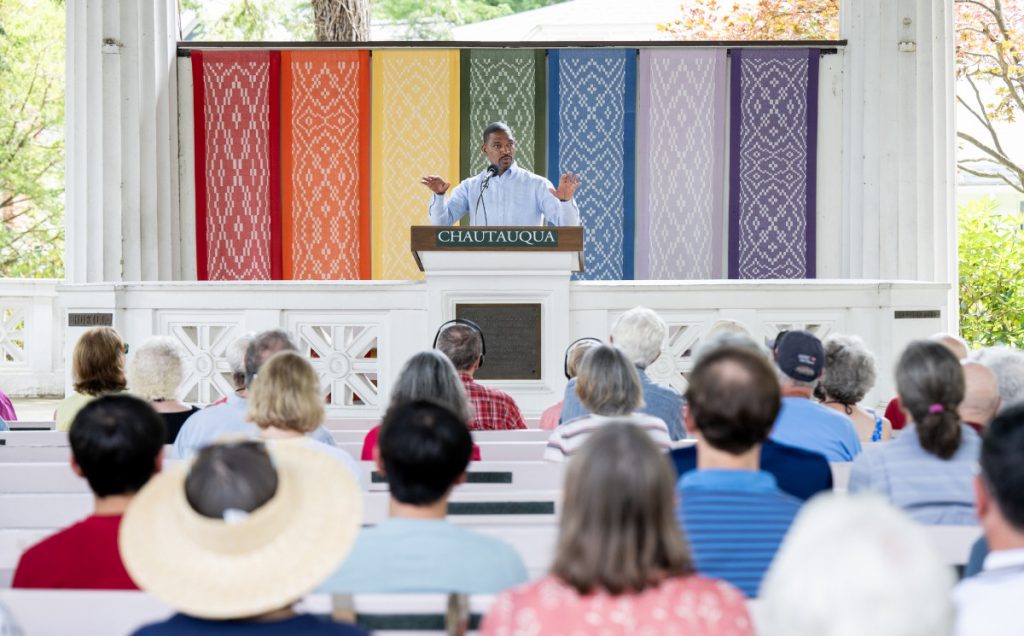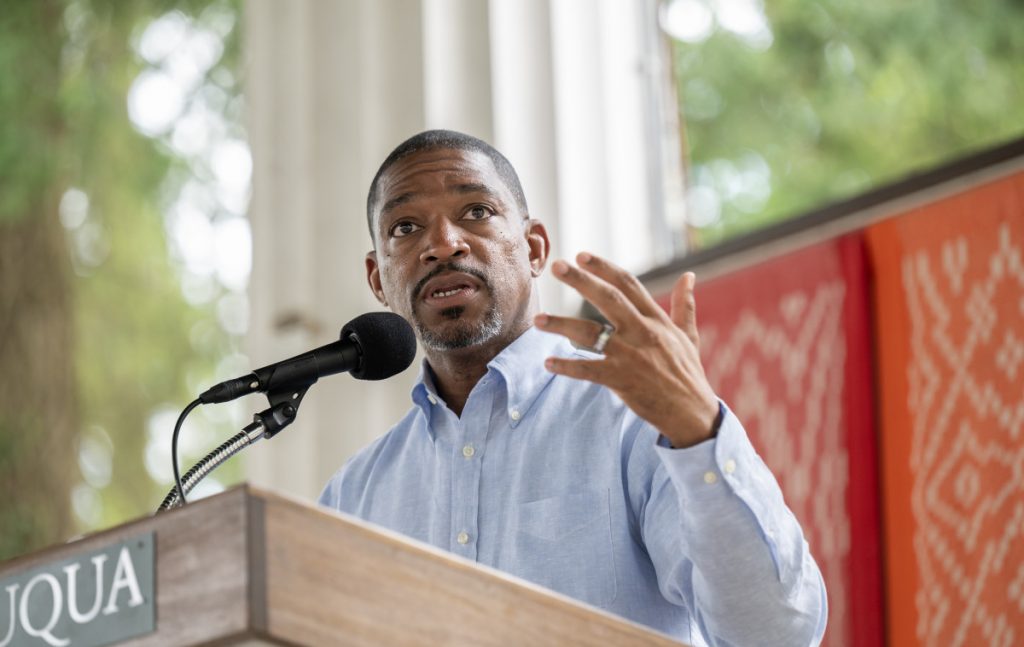
Arden Ryan
contributing writer
Congregations in America, the Rev. Starsky Wilson said, “afford us the most robust, consistent opportunity to engage in the arts.”
Literature, chorus and ritual are all “expressions of art and liturgy that create a context for us to experience the transcendent,” he said to begin his lecture Friday in the Hall of Philosophy.
The art and the liturgy of congregations, create a “container” for theologizing and reflecting on the world, Wilson said, and where the “art meets the articulation, especially in the context of worship,” he said, we “reflect on the human experience in a way that adds to our social infrastructure.”
Closing out the Interfaith Lecture Series Week Five theme on “Religious and Ethical Infrastructure,” Wilson focused on child wellbeing, and the opportunity and “call of congregations” to contribute to how care is provided to children.
Wilson has long been a child advocate, and is the current CEO of the Children’s Defense Fund, a nonprofit for youth rights. Congregations, however, are where he sees the vision for social change develop.
“Spaces of worship allow us to be more sensitive to the realities around us and the human condition,” Wilson said. “Congregations help to sensitize us to the human condition, a critical prerequisite for the building of social infrastructure.”

Faith groups also enable collective action by providing a “cooperative economic structure to provide real assets to respond to the human condition,” making a greater impact than would be possible alone. Congregations, Wilson said, amplify the strength of one into many by “allowing us to put assets together” and aid thousands.
“The spiritual containers of our congregations produce a social infrastructure,” Wilson said, by enabling the curation of theologies that then inform social vision.
“We who engage in spiritual acts may be willing, in ways that others may not be, to consider what is possible beyond what is,” he said.
From those ideas about what is needed in the world emerge the social institutions needed to achieve them, he said. For his part, Wilson explained his call to lead a bi-vocational life, having worked in nonprofits for two decades while engaging with the Church.
“Congregations help to add to social infrastructure by informing civil society institutions with a social vision based upon theological reflection,” he said. People of faith can imagine what God can achieve, which informs them of what is possible to do in the world.
Congregations inspire the vision, Wilson explained, but they also provide the social networks of people able to achieve that vision, gathering those who “by voluntary association and assignment, putting themselves on mission, have the occasion to be with folks that they wouldn’t be with otherwise.”
To impact change, Wilson said, both vision and social networks are needed, with “individuals who are animated and connected with one another.” Then, by the combination of theologizing and coming together, he explained, social institutions can be established.
Wilson summarized his message with a lesson learned from Darren Walker, president of the Ford Foundation: what makes a difference are “innovative ideas, inspired individuals and resilient institutions.”
Wilson shared the story of the Rev. Louis Nollau, a pastor who established what would become Every Child’s Hope, a St. Louis-area orphanage, in the 19th century. Having experience working with a German congregation in St. Louis, Wilson is familiar with the early struggles of Germans in America.
As immigrants, the German people were marginalized, isolated and underserved, Wilson said, but maintained “a sense of hope at the door of the church.” The church was where they turned and brought their children, when no other option existed. Seeing the need, Nollau opened a home for orphaned children, an institution that would serve everyone.
Nollau’s theology informed his vision, Wilson said, which — coupled with a network of supporters — enabled the creation of a social institution that perseveres. It is an example of “the church teaching the secular world how to do care,” he said, at a time when the marginalized weren’t being served.
“Our theological vision and our social network give us the resources we need in order to create institutions” to last, Wilson said, like the orphanage he described, still “living and serving” a century on.
Children in America are the most likely to be poor and to be abused, Wilson said, and the most in need of support. Regions that invest in early childhood development are ultimately more economically fruitful, he said, than those that do not. Faith communities, then, can contribute to child welfare by building ethical infrastructure and having the vision to translate theology into practice.
Wilson closed his lecture by encouraging people of faith to “affirm the audacity of young people” and “take seriously what they think about God.” Allow children the agency to contribute to ethical infrastructure, he said. “Flip things upside down.”
At the Children’s Defense Fund, Wilson is seeing a new initiative to hire a cohort of young adults as consultants to help craft public policy in Washington, D.C., as part of efforts to “put the renewal of children in their hands.”
Doing so, Wilson said, might “create and express a whole new social infrastructure with a theologically informed social vision … where young people’s voices are taken more seriously, and it might express itself in new social institutions (and) social infrastructure, or it might tear all of the ones we have down. And that might not be such a bad thing.”




